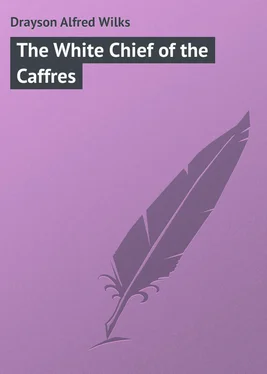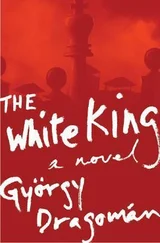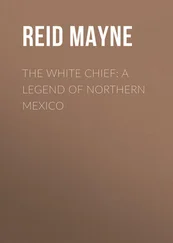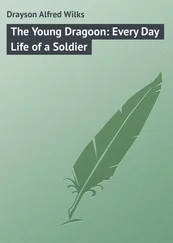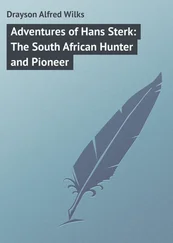Alfred Drayson - The White Chief of the Caffres
Здесь есть возможность читать онлайн «Alfred Drayson - The White Chief of the Caffres» — ознакомительный отрывок электронной книги совершенно бесплатно, а после прочтения отрывка купить полную версию. В некоторых случаях можно слушать аудио, скачать через торрент в формате fb2 и присутствует краткое содержание. Жанр: Прочие приключения, foreign_prose, на английском языке. Описание произведения, (предисловие) а так же отзывы посетителей доступны на портале библиотеки ЛибКат.
- Название:The White Chief of the Caffres
- Автор:
- Жанр:
- Год:неизвестен
- ISBN:нет данных
- Рейтинг книги:4 / 5. Голосов: 1
-
Избранное:Добавить в избранное
- Отзывы:
-
Ваша оценка:
- 80
- 1
- 2
- 3
- 4
- 5
The White Chief of the Caffres: краткое содержание, описание и аннотация
Предлагаем к чтению аннотацию, описание, краткое содержание или предисловие (зависит от того, что написал сам автор книги «The White Chief of the Caffres»). Если вы не нашли необходимую информацию о книге — напишите в комментариях, мы постараемся отыскать её.
The White Chief of the Caffres — читать онлайн ознакомительный отрывок
Ниже представлен текст книги, разбитый по страницам. Система сохранения места последней прочитанной страницы, позволяет с удобством читать онлайн бесплатно книгу «The White Chief of the Caffres», без необходимости каждый раз заново искать на чём Вы остановились. Поставьте закладку, и сможете в любой момент перейти на страницу, на которой закончили чтение.
Интервал:
Закладка:
Our journey was over a beautiful country well watered with little streams, and with plenty of fine trees. We found that a buck, called by the Caffres “ Umseke ” (the riet-bok), was plentiful here, and we surrounded and assagied two or three of these every day, and so had plenty of meat during our journey. On the fifth day we reached the nearest kraal of the tribe who were being plundered by the Bushmen. These kraals were situated on an open plain near some wooded ravines, the mountains being about five miles from them. The people received us with shouts, and gave us amasi and plenty of corn, and we then held a council of war.
From the information given at this council, I learned all about the Bushmen. There was a perpendicular rock about a hundred times the height of a man, on the top of which the Bushmen would assemble and defy the Caffres; to ascend this rock there was a narrow ravine, like a cut in the mountains that only one man at a time could ascend. The Bushmen guarded this, and had large stones ready to drop on the men who came up, and their poisoned arrows to discharge from their bows, so that it was impossible to attack them there with any chance of success.
The Caffres saw no means by which they could kill the Bushmen, as the rock could not be climbed, and was too high for an assagy to be thrown to the top from the plains below. I, however, thought this just the place that would be suitable for my plan; so, after the council, I told Inyati I had heard all that had been said, and everything was just as I wanted it to be. The only thing I feared was, that the Bushmen might come down from their rock and attack me in the plain; but if I had a hundred Caffres with me they would not do this.
As is usual with Caffre expeditions, we started before daybreak, guided by a Caffre who knew the way; and by the time the sun had risen and the mist had cleared from off the plains, we were within sight of the Bushmen’s rock. Inyati here took out his glasses, and after looking at the rock for some time, informed us that there were ten or more Bushmen on the top of the rock looking at us. We advanced quickly till within about four throws of an assagy from them; at which distance we were told, their arrows could not reach us. The Caffres then called to the Bushmen, and asked why they killed the cattle. The Bushmen danced and yelled, and fired two or three arrows at us, all of which fell short of us by many paces. Seeing a large ant-hill a little nearer the rock, I moved up to it; and, resting my rifle on the top, aimed at the group of Bushmen on the hill. Having taken a good aim I pulled the trigger, and when the smoke of my rifle cleared away I saw a Bushman tumbling down the rock, whilst another was lying on the ground kicking, evidently badly wounded. The other Bushmen were so astonished that they gathered round the man who was on the ground, and looked at him, thus giving me another good shot. I fired again, and another man fell down the rock quite dead. The remainder of the Bushmen did not wait for anything more, but retreated at full speed, climbing up the rocks like baboons, and evidently frightened. We waited some time and then the Caffres rushed on to the two men who had fallen and stabbed them with their assagies. They were, however, quite dead, but Caffres like to make sure there is no shamming. The bows and arrows of these men were taken, and also some lion’s teeth and claws that they wore; for these little Bushmen will kill lions with their poisoned arrows, and also elephants.
The Caffres then all came round me and looked at my rifle with evident signs of admiration. The distance at which I had killed the Bushmen was to them a subject of profound astonishment, and also to see that the bullet had gone completely through the men.
Our return to the village was a triumphant march, the men dancing, singing, and brandishing their assagies. Inyati walked beside me carrying the rifle, and asking me questions about the gun; how often it could be fired, how far off it would kill, and how it was made. I was the great hero of the day, child as I was, and these men now looked up to me as to a chief. Our reception at the village was most enthusiastic; men, women and children danced round us, shouting and singing. Unless one had been persecuted as had these people, it would be difficult to realise the importance of such an event as killing two of their enemies. The people at this kraal assured us that the Bushmen would now desert the country. They were very superstitious, and wherever a Bushman died or was killed, that place was at once deserted, as it was considered unlucky; so they felt certain that the Bushmen would now leave that part of the country. Some of the Caffres who had been out with me described to the people at the village how I had fired, and how the Bushmen tumbled down the rock. They were capital actors, and imitated the Bushmen very well. A young ox was killed for a feast, and we had a great supper, many songs, and a large dance; and on the following day returned towards our kraal, which we reached in seven days – a longer time than we occupied on our journey from the kraal, because now we drove with us ten cows, the reward given to Inyati for his assistance.
Chapter Six
A few days after our return from the expedition against the Bushmen, Inyati called me one morning to his hut, in which were two of his counsellors. He then told me that I was raised to the rank of a counsellor, and that he intended to give me three of the cows that he had received from the Caffres, for freeing them of the Bushmen. He said that Caffres, as young as I was, were never made counsellors or had the privileges of men; but the two things I had done, viz., trapping the leopard and shooting the Bushmen, were so extraordinary that the tribe had agreed that I was to be made a chief. The rank which a chief holds among these people is of more importance than any civilised men could understand. The rank gave me command and authority over all men who were not chiefs. I could order them about, make them do work for me, whilst I need do nothing. I thanked Inyati for what he had done, and said I hoped to again show him what my rifle would do, in case there was any occasion for it, and that I believed I could kill an elephant or a lion with it, as easily as I had killed the Bushmen. He replied that “we should see.”
On leaving Inyati I took my assagies and walked out to the hill where my late companions Inyoni and Tembile were watching the cattle, and sat down with them, telling them of my having been made a counsellor and chief. These boys were quite excited at the news and very pleased, and we sat talking some time, till we noticed that the cattle were alarmed by something and seemed uneasy. We ran up to them, and then saw quite a small calf on the ground, and something shiny all round it. In an instant I saw it was an immense snake, as thick as my body. Seizing an assagy, I drove it into the snake’s head, and then, withdrawing it, stabbed it again in the body. The snake uncoiled itself, and came at me; but Inyoni, coming behind it, threw an assagy at it and pinned it to the ground, whilst Tembile drove another spear into it. Seeing my chance, I went close to the monster and stabbed it in the head two or three times, and thus killed it. As soon as we saw it was dead we cut some sticks, sharpened the ends of these, and pegged the snake straight on the ground. It was then longer than the three of us, and was a giant among snakes. The Caffre boys told me there were several such snakes about, and that they would kill and swallow a calf. They knew no other name for it than “Inyoka m’culu” (“the big snake.”) They said these snakes ate only about twice each moon, and after eating slept for many days, and were sometimes then killed by wild pigs and leopards. They said that, many months ago, a Caffre boy was sleeping near here, and whilst asleep one of these snakes came to him, coiled round him and killed him. Before the snake could swallow him, some men came to the place and killed the snake, but the boy had been dead some minutes before they arrived. They described how this snake attacked anything. It first crawled slowly along the ground till near its prey, or waited in long grass, or in bushes, till some animal or bird came near. When close to the animal it wished to capture, the snake lunged rapidly at it, seized it with its teeth and dragged it to the ground, at the same time coiling round the animal and compressing it in its folds. Even a riet-bok could be thus killed by the snake. The reptile then slowly gorges its prey, and remains torpid many days.
Читать дальшеИнтервал:
Закладка:
Похожие книги на «The White Chief of the Caffres»
Представляем Вашему вниманию похожие книги на «The White Chief of the Caffres» списком для выбора. Мы отобрали схожую по названию и смыслу литературу в надежде предоставить читателям больше вариантов отыскать новые, интересные, ещё непрочитанные произведения.
Обсуждение, отзывы о книге «The White Chief of the Caffres» и просто собственные мнения читателей. Оставьте ваши комментарии, напишите, что Вы думаете о произведении, его смысле или главных героях. Укажите что конкретно понравилось, а что нет, и почему Вы так считаете.
